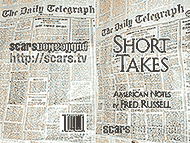



|
enjoy this Fred Russell writing in the free Scars Publications 2015 PDF file chapbook: Short Takes (click on the front cover image or the title text to download the free PDF file) |
 |

|
You can also order this as a 2015 6" x 9" perfect-bound paperback ISBN# book! Click on the book cover to order Short Takes as a book at any time! |
|
|
Order this writing in the book Adrift (issues / chapbooks edition) - the Down in the Dirt Jan. - June 2015 collection book |
 |
get the 378 page Jan. - June 2015 Down in the Dirt magazine issue collection 6" x 9" ISBN# paperback book: |
| ||
![]()




